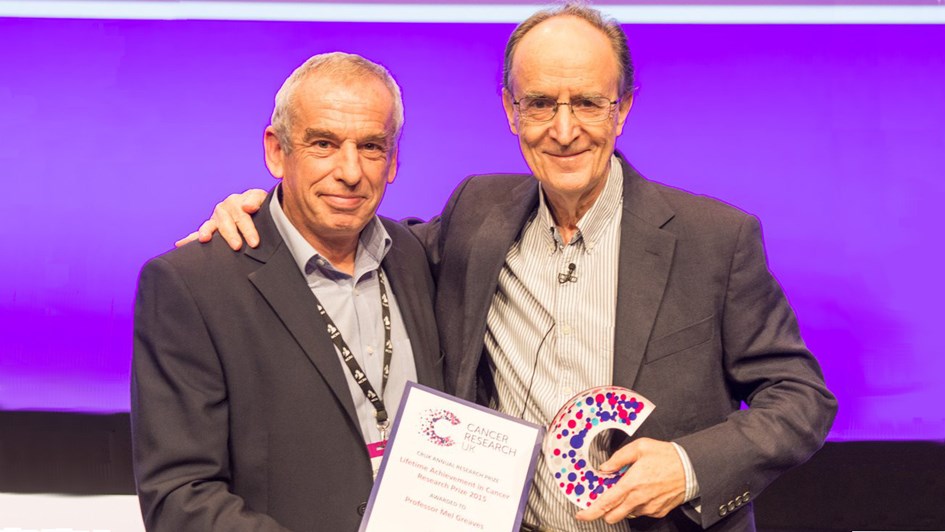Professor Mel Greaves, one of our most distinguished and brilliant scientists here at The Institute of Cancer Research, has just become the deserved winner of this year’s Cancer Research UK Lifetime Achievement Award. He gave a 40-minute lecture at the National Cancer Research Institute (NCRI) Cancer Conference to mark the occasion, and it was a treat for all in the audience – myself included. Here are some of the highlights.
 Professor Mel Greaves receives his lifetime achievement award from CRUK Chief Scientist, Professor Nic Jones Credit: CRUK
Professor Mel Greaves receives his lifetime achievement award from CRUK Chief Scientist, Professor Nic Jones Credit: CRUK
Mel’s Mentors
Mel began his talk describing the influence his mentors have had on his career. Number one was Nobel Laureate Sir Peter Medawar, of whom Professor Greaves said:
“He was the most articulate scientist I’ve ever come across. He had incredible clarity of thought, something I have aimed to foster throughout my career.”
Other scientists who were important in shaping Mel’s’ career were his former tutor and eminent evolutionary biologist John Maynard Smith, his physiology lecturer Andrew Huxley, who taught Mel the importance of scientific rigor, and Alex Comfort – a scientist, clinician and published author who ‘knew how to enjoy himself’.
Motivations
Why did Mel choose to work on such a rare cancer and stick with it?
Mel described several reasons he chose to spend the last 40 years working on childhood leukaemia. There was very little known at the time about the causes of the disease and there were UK-wide clinical trials in progress so he was able to access and analyse blood samples from a large number of patients.
“You have to be opportunistic in science,” he said.
But perhaps the most compelling reason for Mel to continue to study childhood leukaemia came from the heart. Mel first became interested in childhood leukaemia following a tour of Great Ormond Street Hospital in the mid-1970s, when he had young children of his own.
“I defy anyone to look upon children undergoing chemotherapy and not think ‘that could be my child’. That emotion really sustained me throughout my career.”
Mel’s research
Mel has focused for most of his career on one disease – childhood leukaemia. But that’s not to say that his repertoire has been narrow. His research has spanned multiple disciplines, from physiology, immunology, epidemiology, genetics, evolutionary biology and even virology.
Working in collaboration with epidemiologists, Mel observed that the rates of childhood leukaemia across multiple countries tracked with levels of affluence. One theory was that leukaemia might be caused by viral infection, but Mel thought there couldn’t be a simple viral trigger, because otherwise you would expect rates to be higher in poorer countries where there are higher rates of infectious disease.
“To understand why this is the case, you have to know a bit about the immune system” – explained Professor Greaves.
Mel proposed that the situation with leukaemia was similar to the ‘hygiene hypothesis’ that also explains why people in developed countries develop allergies. The role of the immune system is to fight disease, but it needs to be set up to do this as a young age. Delaying the age at which children are exposed to infections can alter the way immune cells behave, and this alteration could be one of the triggers for childhood leukaemia.
He went on to gather evidence for this hypothesis, noting that the more opportunity children have to mix with other children at a young age, the less likely they are to develop leukaemia.
Early on in his career, Mel had a ‘lucky break’, gaining access to a brand new machine called a flow cytometer that could analyse thousands of cells at once. Using this piece of equipment Mel discovered that there were actually many different subtypes of childhood leukaemia. Subsequent advances in genetics allowed Mel to break down these subtypes even further, investigating the genetic mutations that cause childhood leukaemia and the order in which these mutations take place.
Looking at the DNA mutations in individual leukaemia cells, Mel made a game-changing discovery that is now a fundamental concept in cancer biology – that cancer stem cells are the ‘units of evolutionary selection’ in cancer, driving clonal diversity, metastasis and drug resistance. His work led on to a more general understanding of the importance of evolution in understanding the development and progression of cancer, which last year led to him setting up the Centre for Evolution and Cancer at the ICR.
More to come
Mel’s work on leukaemia has changed how the disease is diagnosed and treated, and has had profound implications for the way we think about and conduct cancer research today – providing answers to fundamental questions in cancer biology.
But he’s not finished yet! Mel concluded his talk with a teaser, describing the work he is currently doing to establish whether childhood leukaemia is in fact triggered by a viral infection.
“I hope Paul Workman doesn’t kick me out!” – exclaimed Mel, presumably in jest, because after 30 years as a passionate, prolific and paradigm-shifting researcher at the ICR, it’s unlikely anyone would seek to remove him.
I think we can expect a lot more from Mel in future.
Old geezers and old friends
Mel ended his talk with a tribute to his friend and colleague at the ICR, Professor Chris Marshall, who sadly died earlier this year.
Professor Marshall received the Cancer Research UK Lifetime achievement award two years ago, and when discussing it with Mel in the pub described the accolade as the ‘old geezers award’.
“Well this old geezer is very very grateful, thank you very much.”
comments powered by